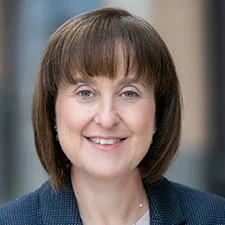Assessing physicians’ well-being is the starting point in health care organizations’ work to reduce burnout. A critical next step is to let physicians know about the changes undertaken at the organizational level and how they were inspired by doctors’ feedback. Doing so can help doctors feel heard, respected and valued, said Suzanna Fox, MD, an ob-gyn and chief physician executive for the for the North Carolina and Georgia division of Advocate Health.
It’s all about two-way communication, Dr. Fox said during an episode of the “AMA STEPS Forward® Podcast." She appeared with Yasemin Moore, associate vice president of clinical leadership and development for Advocate Health.
“The fact that we see improvements almost in every single area help us not only define our strategies but also give us confidence that what we're putting into place is really working,” Dr. Fox said on the podcast, which details some of the ways that Advocate Health has used AMA assessment tools and road maps to help in its focus on physician well-being through its “Best Place to Care” initiative.
Advocate Health, which includes more than 35,000 physicians and medical staff at more than 1,000 locations and 69 hospitals in six states, is a member of the AMA Health System Program that provides enterprise solutions to equip leadership, physicians and care teams with resources to help drive the future of medicine.
In 2023, Atrium Health, which is now part of Advocate Health, received gold-level distinction from the AMA’s Joy in Medicine™ Health System Recognition Program, which empowers health systems to reduce burnout and build well-being so that physicians and their patients can thrive.
The "Best Place to Care" initiative at Advocate Health was launched in 2019 and focuses on supporting physicians and nonphysician providers.
“Our mission statement for Advocate Health is to improve health, elevate hope and advance healing for all, and we realized that it was time to turn that mission statement inward,” Dr. Fox said. “We cannot take the best care of our patients if we don't first take the best care of our physicians” and nonphysician providers.
“As a physician myself, I know that probably the last person I think about is myself, and we really wanted to make sure that taking care of each other—taking care of ourselves—was a priority,” she added.
Helping physicians so they can help patients
The goals of the “Best Place to Care” program include reducing administrative burdens, using technology to improve workflow efficiency and offering mental health and professional development opportunities throughout physicians’ careers, said Moore.
“It was so much more than just helping individuals access support or increase their resiliency,” she said. “We really took a systemic look at how can we support individuals when they need help … and what is the system's responsibility to help reduce those burdens, kind of remove the pebbles from the shoe, so to speak, and those daily hassles that are really getting in the way of our clinicians and their patients.”
The initiative has helped put a name to well-being efforts, said Moore, which has increased recognition among physicians and even helped with attracting and retaining doctors and other health professionals. It has also resulted in a commitment to assessing the scope of both the challenges and successes related to well-being.
“Thanks to the AMA and the Organizational Biopsy®, we're now diligently measuring our progress,” she said. “It's informing our work, and we have a consistent language to speak across our enterprise when we talk about ‘Best Place to Care’ and how we're assessing our initiatives.”
Feedback from physicians and other health professionals also led to an expansion of a pilot program for an augmented intelligence digital scribe to reduce EHR burden.
As the leader in physician well-being, the AMA is reducing physician burnout by removing administrative burdens and providing real-world solutions to help doctors rediscover the Joy in Medicine™.
Taking feedback and acting on it
Advocate Health has also tried to improve communication and feedback loops through listening sessions—both virtual and in-person—as well as newsletters, briefing communications and increasing their presence at network gatherings and family events.
When first looking at this work, physicians at Advocate Health “did not really feel heard. They felt heard at the local level, but not at the more regional and enterprise level,” Dr. Fox said. It’s not just important to explain what actions they’ve taken, she added, but when something cannot be done to detail “why we can't do this in the current state.”
Advocate Health’s assessments have showed that women physicians tend to feel more stress, she said. Having this data in hand has enabled the health system’s leaders to help those who are particularly at risk of burnout and overwork. Based on feedback, they have implemented a part-time track for physicians and other health professionals who want to reduce their work hours.
Knowing that physicians “have other competing priorities in their lives … we've made it very easy to ensure that those who want to establish a part-time track can do that,” Dr. Fox said. Advocate Health also offers support to physicians in litigation, which is reliably rated as one of the most stressful experiences of physicians’ careers.
The Organizational Biopsy also has enabled Advocate Health to measure progress, inform strategies, and demonstrate its commitment to improvement, which Dr. Fox said helped them secure a Duke Endowment grant, which aims to improve health outcomes by supporting health systems that engage patients and provide holistic care.
“We know that we will never be finished with this work. This is an infinite game,” Dr. Fox said. “We will continue to really celebrate the wins, understand the challenges [and] continue to listen to our physicians and” nonphysician providers.
AMA STEPS Forward® open-access toolkits and playbooks offer innovative strategies that allow physicians and their staff to thrive in the new health care environment. These resources can help you prevent burnout, create the organizational foundation for joy in medicine and improve practice efficiency.





